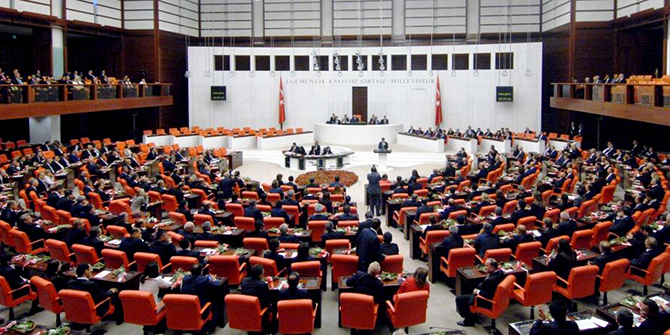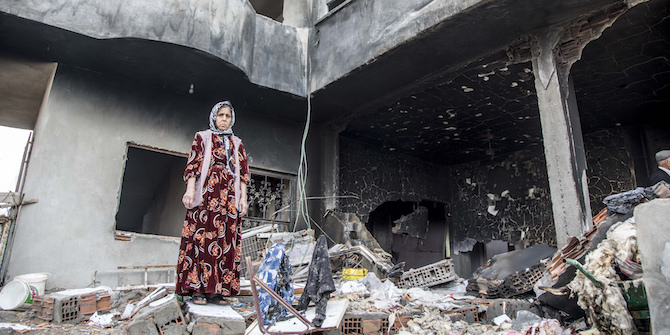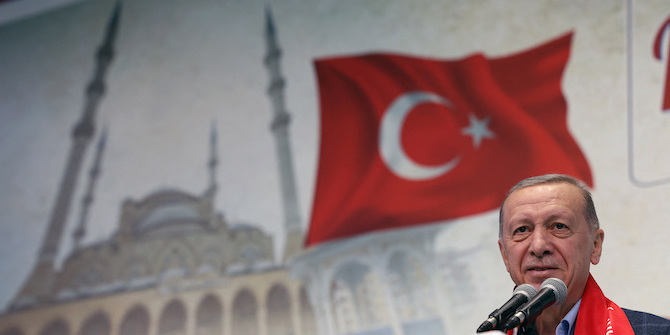by Zeynep Kaya
Undoubtedly the recent general election in Turkey represents another step in the Justice and Development Party’s (AKP) seemingly unstoppable domination of Turkish politics, with results only further consolidating its push towards electoral authoritarianism. What is less appreciated, however, is the fact that the reasons for the AKP’s authoritarian dominance lie just as much in the historical weaknesses of the Turkish democratic system itself as they do in the party’s self-interested and opportunistic embrace of simple electoral majoritarianism as the optimal model of democracy for Turkey.
Three weeks after the election results initially took many observers by surprise in Turkey, and having had a chance to digest them fully, now is a good time to take stock and think about their implications. The AKP lost its overall majority in June, called for re-elections, and on 1 November, managed to comfortably pass the threshold for a return to a single-party government.
The resurgence of the AKP can be attributed to their electoral exploitation of political conditions in Turkey between June and November, a mere five-months period that encompassed a series of major events. The key ethical problem here, which seems to be totally forgotten, is that a second set of elections were unnecessary and a government could have been formed after the June elections. Instead, President Erdoğan and his AKP did everything in their power to prevent this. During that period, Turkey went through an extraordinary period of insecurity and instability, experiencing the biggest terrorist attack on civilians in its history on 10 October in Ankara, following earlier attacks in Suruç and Diyarbakır. The fighting between the PKK and the Turkish army resumed, leading to a large civilian and military death toll, injuries and the imposition of curfews in many cities and towns.
All this was exploited by the AKP who warned of the need for tried and tested hands in government and the need for strong and decisive rule to combat these threats. In addition, previously defecting voters were won back by the party by emphasising the perils of coalition governments, by enabling an ‘us-versus-them’ mentality towards groups it sees as a threat, most notably the Kurds and Gulenists, and finally by deploying a Turkish-nationalist and conservative discourse against the Peoples’ Democratic Party (HDP). An uneasy Turkish public, fearful of a civil war in Turkey, ‘voted for stability not chaos’ in the AKP leader Davutoğlu’s words.
What does this tell us about the health of Turkish democracy? All previous civil and military governments claimed to know what was right for the people and adopted a top-down and paternalistic attitude to running the country long before the AKP ever monopolised the idea. This style of government is entrenched in the system and the AKP has done nothing to challenge this tradition, instead further reinforcing it. For over a decade the AKP has been in a position of majoritarian dominance, giving it the opportunity to tackle some of the systemic structural and politico-cultural factors hindering Turkish democracy. Rather than pushing for a more inclusive political system, it chose to use its electoral majority to accumulate power, marginalise dissent, and try to equate the Turkish state with the political party.
Free and functioning elections with consistently high turnouts are one of the strengths of the Turkish political system. However, critical to enabling effective participation is ensuring that citizens have adequate and equal opportunities to form their decisions through a strong public sphere open to debate. The AKP’s increasingly determined clamp down of any media critical of it and its use of the courts to pursue private citizens, journalists and academics for several reasons (including insulting the President and Prime Minister), and limits imposed on opposition parties’ visibility and audibility inhibit the possibility of open public discussion. Yet this is more rooted into the Turkish political system than a reflection of the tactics of the AKP alone. The AKP itself faced party closure cases in the past during its rule. Several writers, journalists, scholars and activists, even politicians, were tried and imprisoned, and newspapers and associations were closed under Article 312 of the Penal Code for attempting to divide Turkey. The CHP also suffers from a similar tendency. For instance, in early 2015, the CHP’s general secretary Gürsel Tekin had declared that after the June elections, if they win the elections, they would close newspapers that disseminate incorrect and propagandist information.
Turkish citizens’ ability to develop informed understandings of their preferences is inhibited also by top-down agenda control. Citizens should be able to influence the agenda, but, attempts to bring issues other than those identified by the government for deliberation are suppressed. Again, this is a familiar feature of Turkish democracy and is not specific to the AKP. At no point in Turkish political history have citizens felt assured that their judgements and opinions may still be heeded at some level. Today, a large section of society believes their dissenting opinions are too readily dismissed by the ruling elites, condemning their interests to be marginal to the political process for at least as long as the AKP is in power. The polarising policies, actions and rhetoric of the AKP hugely exacerbated this problem and deepened divisions among Turkish society.
Traditionally, Turkey’s political parties have tended to forget that everyone living in Turkey has a legitimate stake within the political process. The AKP is not an exception to this either. Even though its representatives adamantly deny this, the party’s actions suggest otherwise. The AKP’s actions highlight that it wants to impose its mandate upon the entire electorate, free of checks and balances. The party justifies this on the basis that it alone knows what is best for the Turkish people. This top-down interventionist mentality is part of the long-standing Turkish democratic culture and it is regrettable that the AKP has not been an exception. Moreover, the ‘blame discourse’ in Turkish politics, the focus on individuals and their actions rather than prioritising genuine and accountable representation, limits engagement with alternative ideas and policy suggestions.
The politics of consensus has little hope of being embraced any time soon, which will only lead to further decline in the health of Turkish democracy. Although the AKP had the power and ability to change the course of politics, to date, it has shunned this. Rather, it followed in the steps of the previous governments it criticised (recall that prior to acceding to power the AK Party leadership and the Virtue Party they emerged from were those who were pursued through the courts and imprisoned for political dissent). They did this in order to concentrate power in the hands of its leadership, maintain and expand this power. Rather than showing humbleness to work with what the electorate voted for in June and let democracy evolve at its own pace, it exploited political conditions to generate a plurality and looks set to use this rhetoric to justify continuing their project of turning the Turkish state into the AK Party state.
 Dr Zeynep Kaya is a Fellow at the London School of Economics. She completed her PhD in International Relations at LSE on the interaction between international norms and ethnicist conceptions of territorial identity with a focus on the Kurdish case. She is currently working on her book titled The Idea of Kurdistan: International Norms and Nationalism.
Dr Zeynep Kaya is a Fellow at the London School of Economics. She completed her PhD in International Relations at LSE on the interaction between international norms and ethnicist conceptions of territorial identity with a focus on the Kurdish case. She is currently working on her book titled The Idea of Kurdistan: International Norms and Nationalism.







